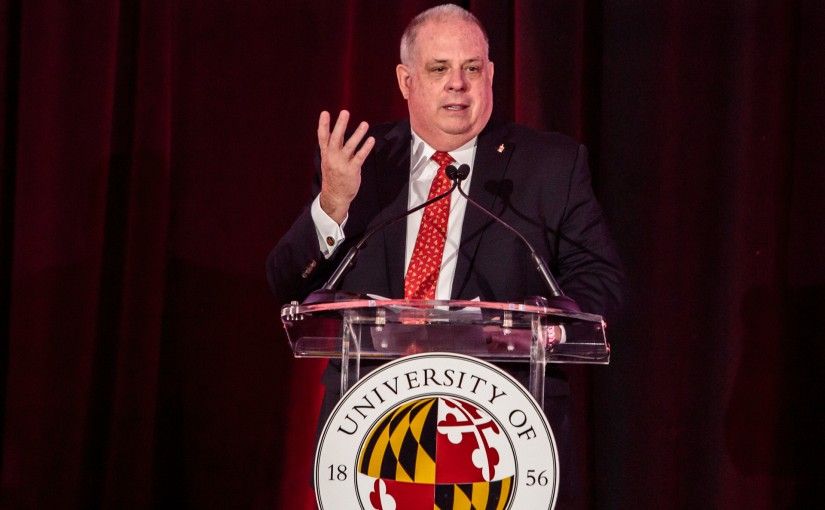Maryland Gov. Larry Hogan won another term over Democratic opponent Ben Jealous, making him Maryland’s first two-term Republican governor in 64 years.
The Associated Press called the the race at 9:07 p.m.
Hogan — who has promised to protect affordable and accessible healthcare for Marylanders, address the opioid crisis and foster economic development — isn’t planning on “changing direction” in his second term, he told the Associated Press in an Oct. 25 interview.
“Everything I’ve been doing and saying and working on for four years would tell you I’m right down the middle,” he said. “I’ve done exactly what I said I was going to do, and two-thirds of the people in Maryland approve of it.”
Throughout his tenure, Hogan has carefully maintained solid approval ratings in a fiercely blue state by touting bipartisanship and largely avoiding confrontation with President Donald Trump.
Kelly Barnes, a freshman kinesiology major at the University of Maryland, said she voted for Hogan even though she didn’t “affiliate with his party.”
“I think that he’s done a good job the past four years,” she said. “And I think he’s well-liked on both sides of the aisle.”
In early October, he had a 20-point lead over Jealous — and 35 percent of registered Democrats said they planned to vote for Hogan, according to a Washington Post-University of Maryland poll.
On the campaign trail, Hogan painted Jealous — a progressive who is the former president of the NAACP and has championed causes like legalizing marijuana and free community college — as “too extreme for Maryland.”
Lately, he’s also been vocal about this university.
Recently, Hogan criticized the University System of Maryland’s Board of Regents — most of whom he appointed — for recommending the school retain football coach DJ Durkin, who was placed on administrative leave after the death of offensive lineman Jordan McNair.
“I am calling on both the University System of Maryland Board of Regents and President Wallace Loh to reconsider their decisions,” Hogan wrote in a statement.
Durkin was fired less than two hours later.
In July, Hogan announced the university will be getting a new Center for Transition and Career Innovation for Youth with Disabilities, which will offer a “comprehensive database on transition services for students with disabilities,” according to a press release.
The center, to be located in the university’s education college, is a collaboration between the university and the state government, according to the release.
When he was elected in 2014, Hogan, a former real estate executive, defeated then-Lt. Gov. Anthony Brown on a campaign that promised relief from tax hikes and business loss. It was his first time holding political office.
Vince Steis, a senior finance and marketing double major, said he voted for mostly Republicans, including Hogan — but described his choice for governor as “more of a vote against Ben Jealous.”
“I’m not a huge Hogan guy — I don’t think he’s actually a Republican, I think he just runs under the R,” Steis said. “But Jealous is more extreme…I just think he’s too much, too soon.”
In November of 2015, Hogan joined a group of mostly Republican governors in seeking to put a hold on Syrian refugees entering the state, according to the Sun. The decision was regarded as an uncharacteristically-right wing decision from the governor.
He also garnered criticism for declining to sign legislation that enacted new protections for LGBT people, which took effect in 2015.
This year, Hogan and supporting groups, such as the Republican Governors Association, spent about $7.5 million on television ads, according to The Washington Post.
At the only gubernatorial debate between Hogan and Jealous, the two clashed over the opioid crisis, the achievement gap in education and gun violence.
Jealous pointed out that Hogan did not declare a state of emergency for the epidemic, which was responsible for 579 deaths between January and March of this year, according to the state health department, until 2017 — two years after he took office.
Hogan then pointed to his appointment of Lt. Gov. Boyd Rutherford to chair the Heroin and Opioid Emergency Task Force and the state’s implementation of the 36 recommendations made by the task force. He also said he’s invested $600 million into treatment and facilities.
The two candidates also came to a head on the topic of education, with Jealous proposing increased teacher pay and universal, full-day pre-kindergarten as a means to better fund schools and close the achievement gap.
Patrick Fleming said Jealous’ positions on education won his vote.
“With the trend recently of colleges getting more expensive, it’s very hard for especially low income students to try to get to this higher upper like stage of education which nowadays is the only way to get into like these baseline jobs,” the sophomore psychology major said.
Hogan funded education with around $25 billion over his four years in office, according to The Baltimore Sun.
During the debate, Hogan also pointed to his endorsement of red flag laws — laws that allow police or family members to request a court order when a person displays “red flags” indicating they could endanger themselves or others — and “tough mandatory sentences on people who commit crimes with guns.”
Hogan has made headlines over his continued push for an independent commission to draw congressional lines in Maryland, critiques of Jealous’ proposed sales tax decrease and free community college, and the possible expansion of Pathways in Technology Early College High School, a program that allows high school students who are interested in STEM careers to graduate in six years or less with a high school diploma and associate degree.



